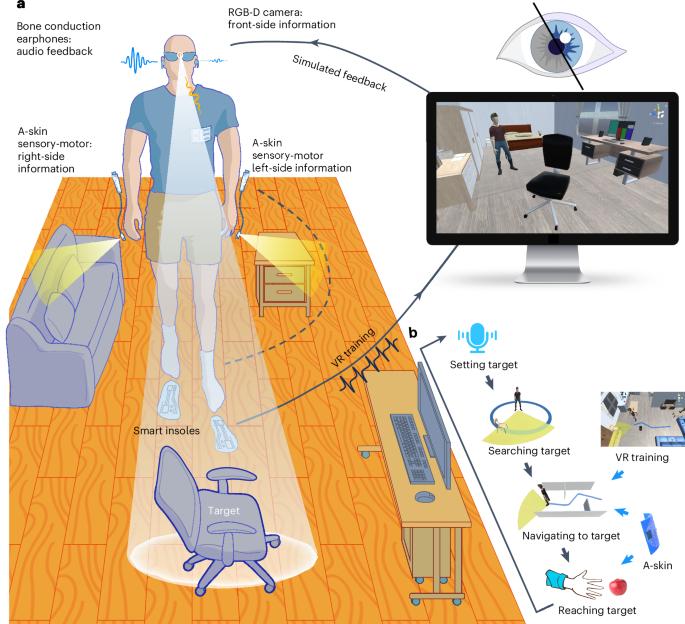Human-centred design and fabrication of a wearable multimodal visual assistance system
IF 23.9
1区 计算机科学
Q1 COMPUTER SCIENCE, ARTIFICIAL INTELLIGENCE
引用次数: 0
Abstract
Artificial intelligence-powered wearable electronic systems offer promising solutions for non-invasive visual assistance. However, state-of-the-art systems have not sufficiently considered human adaptation, resulting in a low adoption rate among blind people. Here we present a human-centred, multimodal wearable system that advances usability by blending software and hardware innovations. For software, we customize the artificial intelligence algorithm to match the requirements of application scenario and human behaviours. For hardware, we improve the wearability by developing stretchable sensory-motor artificial skins to complement the audio feedback and visual tasks. Self-powered triboelectric smart insoles align real users with virtual avatars, supporting effective training in carefully designed scenarios. The harmonious corporation of visual, audio and haptic senses enables significant improvements in navigation and postnavigation tasks, which are experimentally evidenced by humanoid robots and participants with visual impairment in both virtual and real environments. Postexperiment surveys highlight the system’s reliable functionality and high usability. This research paves the way for user-friendly visual assistance systems, offering alternative avenues to enhance the quality of life for people with visual impairment. The development of artificial vision for blind people has been a long-standing endeavour. Tang et al. create a wearable multimodal visual assistance system with a human-centred design, blending software and hardware innovations to enhance usability.


以人为本设计和制造可穿戴多模态视觉辅助系统
人工智能驱动的可穿戴电子系统为非侵入性视觉辅助提供了有前途的解决方案。然而,最先进的系统没有充分考虑到人类的适应性,导致盲人的采用率很低。在这里,我们提出了一个以人为中心的多模态可穿戴系统,通过混合软件和硬件创新来提高可用性。在软件方面,我们定制了人工智能算法,以匹配应用场景和人类行为的需求。在硬件方面,我们通过开发可拉伸的感觉-运动人造皮肤来提高可穿戴性,以补充音频反馈和视觉任务。自供电摩擦电智能鞋垫将真实用户与虚拟化身结合起来,在精心设计的场景中支持有效的训练。视觉、听觉和触觉的和谐合作使得导航和后导航任务有了显著的改善,这一点在虚拟和现实环境中得到了人形机器人和视觉障碍参与者的实验证明。实验后的调查表明,该系统功能可靠,可用性高。这项研究为用户友好的视觉辅助系统铺平了道路,为提高视力障碍患者的生活质量提供了另一种途径。
本文章由计算机程序翻译,如有差异,请以英文原文为准。
求助全文
约1分钟内获得全文
求助全文
来源期刊

Nature Machine Intelligence
Multiple-
CiteScore
36.90
自引率
2.10%
发文量
127
期刊介绍:
Nature Machine Intelligence is a distinguished publication that presents original research and reviews on various topics in machine learning, robotics, and AI. Our focus extends beyond these fields, exploring their profound impact on other scientific disciplines, as well as societal and industrial aspects. We recognize limitless possibilities wherein machine intelligence can augment human capabilities and knowledge in domains like scientific exploration, healthcare, medical diagnostics, and the creation of safe and sustainable cities, transportation, and agriculture. Simultaneously, we acknowledge the emergence of ethical, social, and legal concerns due to the rapid pace of advancements.
To foster interdisciplinary discussions on these far-reaching implications, Nature Machine Intelligence serves as a platform for dialogue facilitated through Comments, News Features, News & Views articles, and Correspondence. Our goal is to encourage a comprehensive examination of these subjects.
Similar to all Nature-branded journals, Nature Machine Intelligence operates under the guidance of a team of skilled editors. We adhere to a fair and rigorous peer-review process, ensuring high standards of copy-editing and production, swift publication, and editorial independence.
 求助内容:
求助内容: 应助结果提醒方式:
应助结果提醒方式:


